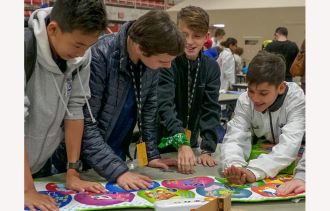
Creativity isn’t a trait unique to those who pursue the arts. Educators say it’s a way of thinking that leads to imaginative and unique solutions to all types of real-world problems.
Creativity is a vast and complex concept that is difficult to understand or pin down. One minute there’s a blank page and then next an idea appears. What happened in between?
Some assume the process of creativity is a binary personality trait reserved for “creative types”, but this understanding causes problems said Dan Griffiths, Nord Anglia Education’s STEAM & MIT Programme Manager.
“It implies so few of us are creative,” Mr Griffiths said.
“We see this in traditional views of subjects — creative minds belong in the arts, right?”
Mr Griffiths said anyone can be creative and that developing creative ways of thinking are what have contributed to advancements in every known field, including mathematics and science.
“Using creativity to find alternative approaches to problems leads to discoveries that the same old well-trodden paths don’t uncover,” Mr Griffiths said.
Developing creativity is also a fundamental skill young people need to succeed in the workplace now and in the future, especially in a world where many of the jobs of tomorrow do not currently exist.
“We may not be able to predict the job market, but the ability to think differently when approaching problems or generating ideas will prepare students for any career,” Mr Griffiths said.
Using creativity to find alternative approaches to problems leads to discoveries that the same old well-trodden paths don’t uncover.Dan Griffiths, STEAM & MIT Programme Manager, Nord Anglia Education
While creativity can be developed in all subject areas, one of the ways it is being taught at NAE is through each school’s approach to STEAM.
Mr Griffiths said the interconnectedness of science, technology, engineering (what we call design and technology in schools), arts and maths, together with applying learning to real-world problems, is challenging and empowering students to come up with creative solutions. This approach pushes students to identify a problem, figure out how to solve it and come up with a range of answers.
“Our pedagogical approach is an important mechanism to fostering creativity,” Mr Griffiths said.
“Students utilise a broad range of knowledge and skills to tackle problems that don’t necessarily have a single answer.”
To enhance student learning, NAE has a collaboration with the Massachusetts Institute of Technology enabling students to explore STEAM by leveraging the university’s cutting-edge research and teaching. This exposes students to a unique university-inspired model of learning. The MIT Challenges, a set of activities assigned to students at the beginning of each academic year, take as inspiration the research of MIT professors working on real-world problems that students can help solve.
Later this month students across NAE schools will take part in STEAM@MIT, an annual week-long event held at the university, immersing students in the MIT culture of mind and hand problem-solving.
During the visit students meet MIT scientists, build models and experiment in specifically designed workshops, as well as learn about recent discoveries that are expected to shape their future. Themes during the visit include everything from robotics, to bioengineering and coding.
Mr Griffiths works closely with MIT to develop the event’s programme, which he said is always action-packed and exciting.
“One time, our students learnt about innovative twin fuselage planes being designed by MIT for the future of air transport. They did their own tests in the Wright Brothers wind tunnel,” Mr Griffiths said.
“Students also studied food computers, technology which enables people to home-grow their own food indoors under computer-controlled conditions.”
Like last year’s STEAM@MIT event, the entire week has been designed to encourage students across NAE’s schools to come up with creative solutions to challenges, Mr Griffiths said.
“Creativity is an invaluable tool for students to have at their disposal and we need to nurture it as best we can,” Mr Griffiths said.
“What we have come to realise is that the future requires all of us to be creative types.”
Originally published on 08 April 2019
Kontakt:
Olga Rasiewicz
Numer telefonu:
Kliknij, aby wyświetlić numer
Strona internetowa:
Odwiedź stronę szkoły